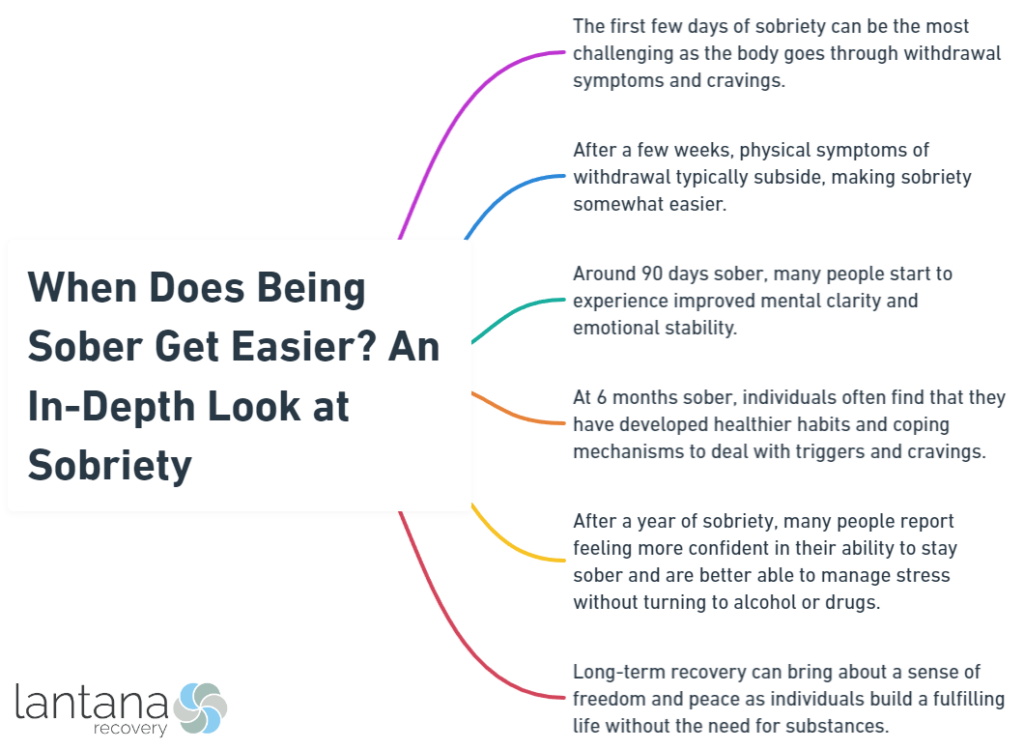Embarking on the journey to sobriety can be challenging and, at times, may feel like an uphill battle. But what if we told you that it gets easier as time goes on? That’s right, as you navigate the initial hurdles and embrace personal growth, support systems, and lifestyle changes, the path to a sober life becomes smoother. In this blog post, we’ll dive deep into the challenges of early sobriety, when being sober gets easier, the turning points that make it easier, the benefits of long-term sobriety, and strategies for staying sober. So buckle up and let’s explore the road to a healthier, more fulfilling life together.
Short Summary
- Manage physical and emotional/psychological challenges with healthy coping strategies, a strong support network, and sober activities.
- Commit to personal growth & healing, make positive lifestyle changes & establish new habits for successful long-term sobriety.
- Enjoy improved relationships, a sense of purpose, and enhanced mental health when you stay sober over time!
The Initial Challenges of Sobriety

The early days of sobriety are often the most difficult, as you confront physical withdrawal symptoms, emotional and psychological challenges, cravings, and triggers. It’s important to recognize that these challenges are a normal part of the process, as your body and brain adjust to a life without alcohol or drugs. The road to recovery may not be easy, but with determination and courage, you can overcome these initial obstacles and move towards a healthier, more fulfilling life.
As you begin your journey to sobriety, it’s essential to seek guidance from medical professionals like those at Lantana Recovery and develop a comprehensive treatment plan that addresses the various aspects of addiction, including physical dependence, mental illness, and behavioral change. By understanding the challenges you’ll face, such as substance abuse, and arming yourself with the tools and strategies needed to combat them, you can set the foundation for a successful recovery.

Physical Withdrawal Symptoms
Physical withdrawal symptoms are a common and challenging aspect of early sobriety, as your body undergoes the process of detoxification. Long-term alcohol dependence can lead to serious health complications, such as liver damage, high blood pressure, and an increased risk of certain cancers. Short-term signs of drug abuse include slurred speech, impaired coordination, and memory loss.
During alcohol detox, individuals may experience a variety of physical symptoms, such as headaches, vomiting, sweating, and anxiety. These withdrawal symptoms are a result of the body adjusting to the absence of alcohol or drugs after alcohol abuse and can be managed with the help of medical professionals and appropriate addiction treatment.
By addressing these physical symptoms, you can pave the way for a smoother and more comfortable transition into a sober life.
Emotional and Psychological Challenges
In addition to physical symptoms, early sobriety can also bring emotional and psychological challenges. These may include unpredictable social interactions, guilt, shame, and regret. Individuals struggling with mental illness may find these challenges particularly difficult to manage, as alcohol addiction can mask or intensify the symptoms of a co-occurring disorder.
Overcoming these emotional and psychological hurdles is crucial for achieving lasting sobriety. This involves learning to effectively deal with difficult emotions such as sadness, anger, and anxiety, facing long-buried emotions, and developing emotional maturity and self-compassion. You may think that your personality is changing and by creating healthy coping strategies, constructing a strong support network, and participating in sober activities, you can conquer these challenges and lay the groundwork for lasting behavioral change.
Cravings and Triggers
Cravings and triggers are another common challenge faced by those in early recovery. The fear of intense cravings, intrusive thoughts, and the need to actively avoid relapse is a common concern for people fresh out of rehab. However, it’s essential to remember that cravings are a normal part of the recovery process and can be managed with determination and perseverance.
To triumph over cravings, it’s vital to identify your triggers, seek addiction treatment, build a supportive network, and engage in sober activities. By focusing on your goals, utilizing available resources, and embracing cravings, you can make sobriety easier over time. Remember, the more you practice and commit to your recovery, the more manageable cravings and triggers will become.
The Turning Point: When Sobriety Starts Getting Easier

As you progress in your recovery journey, you’ll likely notice a turning point when sobriety starts getting easier. This shift can be attributed to a combination of personal growth, healing, the development of a strong support system, and positive lifestyle changes. By embracing these factors and remaining committed to your recovery, you’ll find that the challenges of early sobriety gradually give way to a more manageable and fulfilling life.
The key to this turning point lies in your willingness to learn, grow, and adapt. By staying open to advice and embracing new experiences, you’ll be better equipped to handle the ups and downs of sober life. As you continue to build on your recovery foundation, you’ll find that the once-daunting challenges of sobriety become more manageable, allowing you to seamlessly transition to a healthier and more fulfilling life.
Personal Growth and Healing
Personal growth and healing are essential components of a successful recovery journey. This process involves self-improvement, self-awareness, and recovery from emotional or psychological wounds. By focusing on personal growth, you can increase your awareness of your own thoughts, feelings, and behaviors, and develop effective coping strategies to manage cravings and triggers.
There are numerous ways to embark on a journey of personal growth and healing. Journaling, meditation, therapy, and engaging in sober activities are all excellent methods to gain insight into your thoughts and feelings and to develop healthier coping strategies.
As you continue to grow and heal, you’ll find that your ability to navigate the challenges of sobriety becomes stronger, and the road to recovery becomes smoother.
Support Systems and Accountability
A strong support system and accountability are crucial in maintaining long-term sobriety. Support systems provide the emotional and practical assistance you need to reach your goals, while accountability helps ensure that you stay on track and meet your responsibilities. By surrounding yourself with people who can offer encouragement and guidance, you’ll be better equipped to face the challenges of sobriety and stay committed to your recovery.
Creating a strong support system involves finding people who can provide emotional and practical support, such as family, friends, and professionals. Establishing systems of accountability, such as regular check-ins with a therapist or sponsor, or using an app to track progress, can also prove invaluable in your journey to sobriety.
“Recovery is best understood as a personal journey of socially negotiated identity transition, occurring through changes in social networks and meaningful activities” (Leisure participation, SUDs, and recovery, Harmon, 2017.) By building a reliable support network and holding yourself accountable, you’ll find that the challenges of sobriety become more manageable, and the path to a sober life becomes easier to navigate.
Lifestyle Changes and New Habits
Adopting healthier habits and making positive lifestyle changes can significantly impact your ability to stay sober. By prioritizing self-care, engaging in regular physical activity, and nurturing social connections, you can reduce cravings and triggers while providing yourself with a sense of purpose and accomplishment.
Some examples of positive lifestyle changes and new habits include eating a balanced diet, exercising regularly, getting enough sleep, managing stress, and fostering social connections. By incorporating these healthy habits into your daily routine, you’ll be better equipped to handle the challenges of sobriety and stay committed to your recovery journey.
As you continue to grow and adapt, you’ll find that maintaining a sober life becomes increasingly manageable and fulfilling.
The Benefits of Long-Term Sobriety

As you continue on your journey to sobriety, you’ll begin to reap the numerous benefits of long-term sobriety. These benefits include improved physical health, superior sleep quality, heightened energy levels, and enhanced mental focus and clarity. In addition to these tangible benefits, long-term sobriety can also bring about incredible improvements in relationships and overall well-being.
By maintaining a sober life, you’ll find that your world opens up new opportunities and experiences. The challenges of early sobriety will gradually fade, replaced by a newfound sense of purpose, accomplishment, and satisfaction. With each passing day, you’ll grow stronger in your resolve to stay sober and continue to enjoy the many benefits that come with long-term sobriety.
Physical Health Improvements
One of the most significant benefits of long-term sobriety is improved physical health. As your body adjusts to life without alcohol or drugs, you’ll experience various health improvements, such as enhanced liver function, decreased risk of heart problems and certain types of cancer, improved sleep patterns, better nutrition, and physical fitness, and increased energy and mental clarity.
These physical health improvements not only contribute to a higher quality of life but also serve as a powerful motivator to maintain your sobriety. By prioritizing your health and embracing a healthier lifestyle, you can continue to enjoy the numerous physical benefits of long-term sobriety and build a strong foundation for a fulfilling, sober life.
Mental Health and Emotional Stability
Long-term sobriety can have a profound impact on your mental health and emotional stability. As you progress in your recovery, you’ll likely experience increased mental clarity, decreased risk of mental health conditions, stronger relationships, enhanced sleep quality, and a heightened sense of purpose.
By addressing the emotional and psychological challenges of early sobriety, you can pave the way for improved mental health and emotional stability in the long term. This, in turn, can lead to a more fulfilling and satisfying life, as you become better equipped to handle life’s challenges, build stronger relationships, and pursue your passions and interests.
Enhanced Relationships and Social Life

There are so many reasons to maintain sobriety and sobriety can bring about remarkable improvements in your relationships and social life. As you become more honest and transparent with yourself and others, you’ll have the opportunity to foster meaningful social connections and build a supportive network.
Engaging in sober activities, attending support groups, working with professionals at Lantana, and nurturing relationships with friends and family are all excellent ways to enhance your social life and build a strong support system. As you continue to grow in your sobriety, you’ll find that your relationships and social life flourish, providing you with a rich and rewarding support network that can help you stay committed to your recovery journey.
Strategies for Staying Sober

Maintaining sobriety requires a combination of practical strategies and a commitment to personal growth and development. By identifying triggers, avoiding risky situations, having a self-care practice, relying on a support system, attending therapy, finding healthy coping strategies, and setting realistic goals, you can lay the groundwork for lasting sobriety and preventing relapse.
In this section, we’ll provide you with practical tips and strategies to help you stay sober and navigate the challenges of recovery. By incorporating these strategies into your daily routine, you’ll be better equipped to face the ups and downs of sober life and continue on your journey to long-term sobriety.
Coping Mechanisms and Stress Management
Developing healthy coping mechanisms and effectively managing stress are essential components of a successful recovery journey. By learning to recognize and address your emotions, thoughts, and behaviors, you can cultivate a strong foundation for managing stress and maintaining sobriety.
Effective coping mechanisms and stress management strategies include deep breathing, exercise, eating a nutritious diet, and reaching out to supportive people. By practicing these strategies, you can empower yourself to better manage your stress levels and discover healthier ways to cope with challenging situations, ultimately contributing to a more successful and fulfilling recovery journey.
Building a Support Network
Building a strong support network is crucial in maintaining long-term sobriety. A reliable support network can provide the emotional and practical help you need to navigate the challenges of recovery and stay committed to your goals.
To build a strong support network, reach out to friends and family, join a support group, and take advantage of online resources. By surrounding yourself with people at Lantana Recovery who understand and support your sobriety goals, you’ll be better equipped to face the challenges of sober life and continue on your journey to long-term sobriety.
Engaging in Sober Activities
Engaging in sober activities and hobbies can be an excellent strategy for maintaining long-term sobriety. Sober activities provide an alternative to drinking or using drugs and can help reduce stress, boost self-esteem, and bring a sense of purpose and accomplishment.
There are countless sober activities to explore, such as spending time in nature, learning a new hobby, volunteering, organizing a game or puzzle night, attending a sober meet-up, exploring family history, taking an in-person or virtual class, and joining a sports team. By participating in these activities, you can cultivate a fulfilling and engaging sober life, making it easier to stay committed to your recovery journey.
Real-life Stories: When Sobriety Got Easier for Others

Hearing the stories of others who have successfully navigated the challenges of early sobriety and found that it gets easier over time can be incredibly inspiring and motivating. From overcoming cravings and triggers to building a strong support system and accountability, these individuals provide valuable insight into making sobriety easier on the journey toward lasting sobriety.
One such inspiring story comes from Molly Lauroesch, who shares her commitment to sobriety and how it has positively transformed her life. With a strong dedication to nutrition, holistic approaches, and fitness, she now rarely has thoughts of drinking and is thriving in her sober life. Studies have even shown that sobriety can get easier after the first year, providing hope and encouragement to those in the early stages of their recovery journey.
These real-life stories serve as powerful reminders that sobriety is achievable and that the challenges of early recovery do get easier over time. By learning from the experiences of others and applying the strategies and tools they’ve shared, you can continue on your own journey to a healthier, more fulfilling life.
Summary
In conclusion, the journey to sobriety may be challenging, but with determination, personal growth, a strong support system, and positive lifestyle changes, it does get easier over time. By understanding the challenges of early sobriety, embracing the turning points, and applying practical strategies for staying sober, you can continue on your path to a healthier, more fulfilling life. Remember, the road to recovery may be long, but with each step, you’re building a better future for yourself and those around you. Stay strong and keep moving forward.
Frequently Asked Questions
What is the hardest month of sobriety?
The first few weeks of sobriety can be especially tough, as your body is going through withdrawal and you may experience strong cravings. Seek support from professionals and treatment centers to make it through this difficult period.
What are the hardest days of sobriety?
The first three days and the first week of sobriety are usually the most challenging. You may experience withdrawal symptoms such as sweating, nausea, and an intense urge to use the substance again. Taking it one day at a time is key to overcoming these difficult periods in sobriety.
How long after quitting alcohol does it get easier?
Quitting alcohol can bring relief in just a couple of weeks, though emotional issues may take longer to improve. It is important to remember that the process of quitting alcohol is not easy, and it may take time to see the full benefits. However, with dedication and support, it is possible to make a difference.
What happens in the first 7 days of sobriety?
The first week of sobriety can be difficult, as common symptoms such as headaches, sweating, tremors, insomnia, nightmares, anxiety, and fear are likely to occur. However, with proper support and dedication, successful sobriety is possible.
What are the most common challenges faced in early sobriety?
The most common challenges faced in early sobriety are physical withdrawal symptoms, emotional and psychological challenges, cravings, and triggers.









